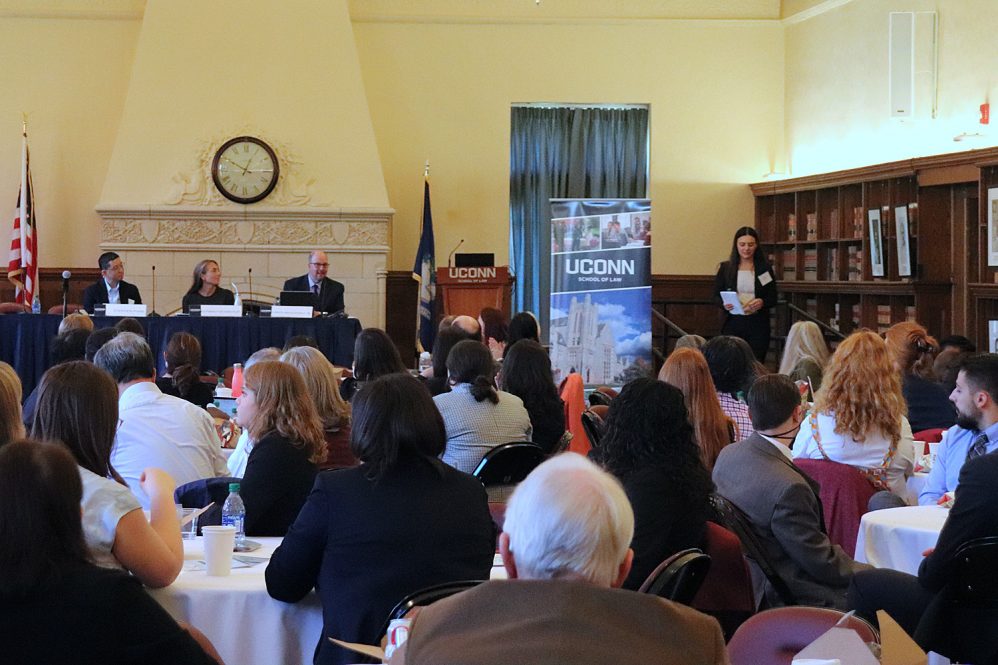The transition to more sustainable energy practices must be intentional and thoughtful to ensure that it is also just and equitable for the communities most threatened by climate change, panelists agreed at a symposium held by the Connecticut Law Review.
The symposium, entitled Climate and Environmental Justice in the 21st Century: A Just Transition, was held October 21, 2022, online and in person in the Reading Room of William F. Starr Hall. The Connecticut Law Review organized the event, which was co-sponsored by the Center for Energy & Environmental Law at the UConn School of Law, the U.S. Embassy in Brazil, and the Human Rights Clinic at Pontifícia Universidade Católica do Paraná.
In opening remarks, Associate Dean Richard Wilson addressed the urgency of the climate crisis and the need for scholars, practitioners and students to advance research and policy on matters of pressing concern.
“I applaud the decision to focus on the climate emergency and seek to identify the ways in which law might promote and facilitate the transformation to sustainable energy practices,” Wilson said. “Few issues are of greater importance than the existence of life as we know it on this fragile planet.”
Michael Fitzpatrick, director of global strategy and innovation for global affairs at Google, gave the keynote address and engaged in a discussion with Professor Joseph McDougald, executive director of the Center for Energy & Environmental Law. Fitzpatrick, who has wide corporate and government experience in environment and regulatory law, gave a nuanced view of the transitions in the human relationship with technology, and how that affects climate solutions.
“Climate change is an extistential threat to humanity, and it is a transition occurring on our globe that we are going need to manage our way through,” Fitzpatrick said. “Technology holds the promise to solve our biggest challenges as humans and as a society, but I fully acknowledge the challenges and risks that come with it and the negative externalities that flow from scaled technology.”
The first panel, moderated by Paschaline Nsiah-Asare LLM ’17, a research specialist at the Center for Energy & Environmental Law, discussed what a just transition looks like globally and what legal structures and tools the law can rely on to facilitate a just transition and respond to climate emergencies.
The panelists, offering a variety of perspectives, were Owen McIntyre a professor of law at the University College Cork in Ireland, where he directs the Environmental and Natural Resources Law LLM program; Wyatt Sassman, environmental law professor at the University of Denver’s Sturm College of Law; and Pooven Moodley, a human rights lawyer and social justice activist from South Africa. Moodley directs Natural Justice, a team of lawyers who specialize in human rights and environmental law.
The second panel focused on labor transitions in energy communities that have traditionally relied on fossil fuels, and what obligations corporations have to support the transition to more sustainable practices. MacDougald moderated the discussion, which included Katrina Fischer Kuh, the Haub Distinguished Professor of Environmental Law at Pace University Law School; Stephen Park, an associate professor of business law and the Satell Fellow in Corporate Social Responsibility at the UConn School of Business; Aisha Saad, an Earl B. Dickerson Fellow at the University of Chicago School of Law; Danielle Pamplona, a law professor at Pontifícia Universidade Católica do Paraná in Brazil; and Daniella Moreira, a professor at Pontifical Catholic University of Rio de Janeiro and academic coordinator of its specialization course in environmental law.
The symposium ended with a third panel, moderated by Louanne Cooley, a legal research fellow with the Connecticut Institute for Resilience and Climate Adaptation who earned a JD and is now pursuing an LLM at UConn Law. The panel explored efforts in Connecticut to address the energy transition, with a focus on the 2021 Climate and Community Investment Act.
The panelists included Katie Dykes, the Connecticut’s Commissioner of Energy and Environmental Protection; Leticia Colon de Mejias, founder and CEO of Energy Efficiencies Solutions; Jim O’Donnell, professor of Marine Sciences at UConn; and Tabitha Sookedeo, a joint degree student at the Yale School of the Environment and Vermont Law School who focuses on refugee resettlement and climate migration.
“The symposium was a success in bringing together a variety of practitioners and scholars to discuss different facets of facilitating a just transition,” said Ali Nicolay, an associate member of the Connecticut Law Review. “As a law student with an interest of practicing environmental law, I found this event was a great way to gain more insight into the field and the anticipated changes in it.”



